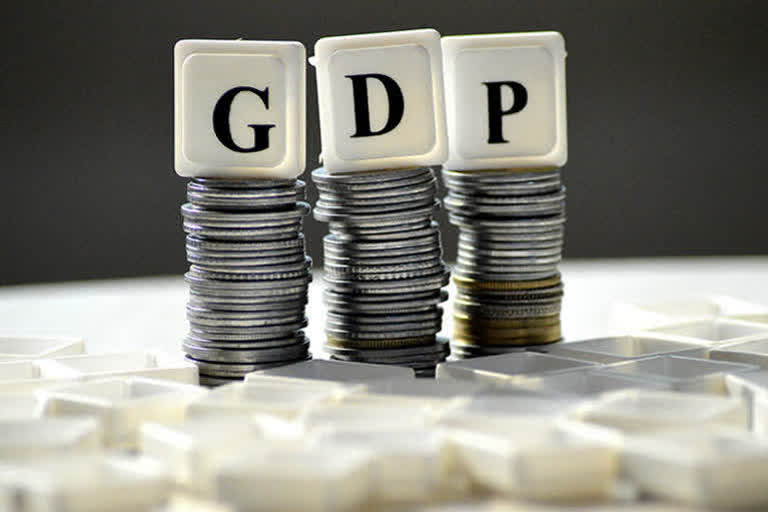New Delhi: Industry body FICCI on Sunday said its Economic Outlook Survey has projected the country's annual median GDP growth for 2020-21 at (-) 4.5 per cent.
With the rapid spread of COVID-19 pandemic manifesting into an economic and healthcare crisis globally, the latest forecast marks a sharp downward revision from the growth estimate of 5.5 per cent reported in the January 2020 survey, it said.
The pandemic outbreak has severely impacted the economic activities as the country had to go through a lockdown to check spread of the virus. However, the restrictions are being gradually eased.
While addressing SBI Banking and Economics Conclave on Saturday, RBI Governor Shaktikanta Das said the Indian economy has started showing signs of getting back to normalcy in response to the staggered easing of restrictions.
"It is, however, still uncertain when supply chains will be restored fully; how long will it take for demand conditions to normalise; and what kind of durable effects the pandemic will leave behind on our potential growth," he said.
In May, the Reserve Bank had said the GDP growth during 2020-21 is likely to remain in the negative territory.
Releasing details of the survey, FICCI said the present round of 'Economic Outlook Survey' was conducted in June 2020 and drew responses from leading economists representing industry, banking and financial services sector.
"The latest round of FICCI's Economic Outlook Survey puts forth an annual median GDP growth forecast for 2020-21 at (-) 4.5 per cent - with a minimum and maximum growth estimate of (-) 6.4 per cent and 1.5 per cent respectively for 2020-21," it said.
As per the survey, the quarterly median forecasts indicate GDP growth to contract by (-) 14.2 per cent in the first quarter of 2020-21, with a minimum estimate of (-) 25 per cent and a maximum estimate of (-) 7.4 per cent.
Economic activity-wise annual forecast indicated a median growth of 2.7 per cent for agriculture and allied activities for 2020-21.
"Agriculture seems to be the only sector with a silver lining right now. There is an apparent upside as far as the performance of monsoon is concerned this year and the water reservoir levels in the country stand at good levels," the industry chamber said.
According to the survey, the rural sector supported by a steady agriculture performance and hopefully a contained number of COVID-19 cases will be a key demand generator for India this year.
The survey further said that industry and services sector, on the other hand, are expected to contract by 11.4 per cent and 2.8 per cent, respectively in 2020-21.
Weak demand and subdued capacity utilisation rates were already manifesting into a drag on investments and the COVID-19 pandemic has further extended the timeline for recovery, it said.
Read more:India must not make the mistake most failed nations have made: Kaushik Basu
Even though activity in sectors like consumer durables, FMCG is gaining traction, majority of the companies are still operating at low capacity utilisation rates. Labour availability and feeble demand remain as major issues for the companies, it added.
"Therefore, fresh investments will be difficult to come by in the near to medium term. Also, a significant change in consumption patterns is expected on back of uncertainty with regard to jobs and income losses," FICCI said.
It noted that absence of demand stimulus, a second wave of the pandemic and continuation of social distancing and quarantine measures will weigh heavy on growth prospects.
"With demand and investment outlook muted, robust government expenditure has been the only saviour. Nonetheless, growth is likely to bottom out post the second quarter of current fiscal year," it said.
According to the survery, some of the stimulus measures are reaching to the ground especially through the credit guarantee scheme for MSMEs and support through MGNREGA which is positive.
During the survey, economists were asked to share their views on the fiscal stimulus package 2.0 and any additional measures that can be undertaken.
Participants were of the view that government measures in stimulus focussed broadly on saving lives and undertaking deep structural reforms.
"They, therefore, felt that while the quasi fiscal measures and structural reforms announced were undoubtedly steps in the right direction, on ground implementation and results will take a long time to work through in the present environment," it added.
A majority of economists believed that the government could have undertaken "a more aggressive" fiscal stance than what has been announced in the two packages combined.
Participating economists also highlighted that the measures announced by both the Reserve Bank of India and government focussed largely on addressing supply side constraints with limited support for creation of demand.
FICCI said the surely participants unanimously believed that the RBI would undertake further cuts in the repo rate going forward to minimise the economic shock and stabilise financial markets.
Nonetheless, a majority of the participants also opined that cutting interest rates would not pump economic growth given that the demand conditions have remained subdued from even before the COVID pandemic struck the economy.
The fast-changing macroeconomic environment and deteriorating outlook for growth necessitated off-cycle meetings of the Monetary Policy Committee (MPC) of the RBI first in March and then again in May 2020.
The MPC decided to cumulatively cut the policy repo rate by 115 basis points over these two meetings, resulting in a total policy rate reduction of 250 basis points since February 2019.
FICCI said economists were asked to suggest ways with which India could best utilise the present opportunity to expand its presence in the global value chains.
Efforts towards liberalisation of FDI policy must be complemented with improving infrastructure and ease of doing business in the country, it added.
(PTI Report)



